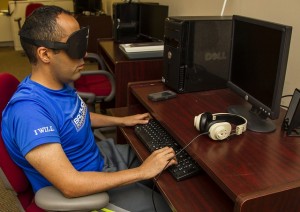
Recently, I was having an online conversation about the challenges of finding participants for testing – specifically, the challenges of finding participants with disabilities.
Someone put the view; “if we’re having trouble finding people with disabilities, then maybe we would be better concentrating our development efforts on people without disabilities”.
“We can’t find them so they don’t matter” is wrong
I’m extremely concerned about this view. Certainly in the UK, and I strongly suspect in the US and in other countries, we have a huge issue about people with disabilities being excluded from economic and other activities simply because they are disabled, irrespective of whether or not their particular disability in fact is a barrier in that activity.
People with disabilities face barriers to work
For example, people with disabilities are far more likely to be unemployed than people without disabilities. The Department for Work and Pensions offers these facts and figures on disability and employment:
- Only about half of disabled people of working age are in work (46.3%), compared with 76.4% of non-disabled people of working age.
- Over two million disabled people are economically inactive.
Often, a job is closed to someone with a disability for an irrelevant reason. For example, they might be mobility-impaired, could get about sufficiently for the job, but don’t get a chance at it.
It’s actually illegal in the UK, and in many other countries, to discriminate against people with disabilities in this way. But that doesn’t stop it happening, sadly.
Chicken or egg? Our designs create barriers
I believe we’re in a chicken-and-egg situation here.
- Disabled people with specific skills and interests may be hard to find.
- That means that we don’t ensure that they can use things that might allow them to acquire those skills or interests.
- That means they are hard to find.
I know it’s not a direct one-to-one. Someone, perfectly well-meaning, works on a product A and can’t find the right people to test it. That product ends up excluding some people. It’s irrelevant to their acquisition of skills, interests, jobs etc.
But what happens is that: product A gets copied in product B. Or the approach used by product A gets copied. Or the people who worked on product A get used to not thinking about disabled people. And so, insidiously, the vicious circle builds up: ‘don’t know them, don’t need to know them, they don’t matter’.
Fight harder to include people with disabilities
We need to fight harder, try harder, work harder to get it across that accessibility means usability plus access. And that means, test with people with disabilities.
Only a few years ago we constantly heard arguments about not being able to find users at all. We worked at it and we learned ways to find them. Now we need to do the same for a wider marketplace: the people that we ought to be designing for, as well as the people it’s easy to find to design for.
Tips for finding people with disabilities
And, to be more practical for a moment, here are some ways of finding people with disabilities and with specific jobs, interests or whatever. (Thanks to posters on Disability Now for their help with these suggestions).
- Look around your own organisation. You yourself may have a disability; you may have colleagues with declared or undeclared disabilities who may be willing to help you – given appropriate confidentiality.
- Approach lobby groups, action groups, charities or societies with particular disabilities as their interest.
- Ask everyone you know if they happen to know someone with the particular disability.
- If you find someone in the right demographic, ask that person if they know anyone else in the same demographic. (This is sometimes called ‘snowball recruiting’).
- Volunteer for a group that includes people with disabilities and get to know them personally.
- Advertise in publications aimed at people with disabilities.
This is an updated version of the article “We can’t find them so they don’t matter” that first appeared in ‘Caroline’s Corner’, in the January 2005 edition of Usability News.
Contestants in wheelchair marathon (c) copyright Stephen Craven and licenced for reuse under Creative Commons featured image by US Department of Defense, creative commons
